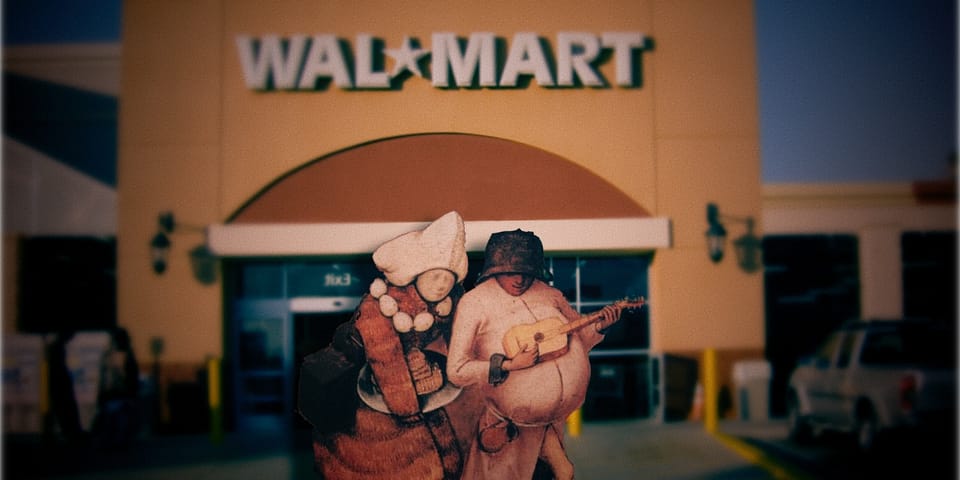AI Music As Walmart As Utopia

In Utopia as Replication, Fredric Jameson makes a spicy argument for looking at Walmart as a utopia. It is a pretty readable essay as far as Jameson goes. He of course isn't suggesting that Walmart as it actually exists is any kind of utopia, but uses it as an example precisely because, despite its position as a malevolent colossus of capitalism, Jameson believes that 'the utopian impulse' — a kind of flickering potential of how things can be better — can be seen everywhere, even here. He points to things like how Walmart is so large it has for all intents and purposes defeated 'the free market', something most of us can only dream of doing! How it can make life (sort of) affordable for the poorest Americans, how it drives useful technical innovation through its global logistic needs, things like that. Things that could, at the flick of an ideological switch, be used for good instead of the evil Walmart actually wields.
Don't get me wrong, it doesn't feel particularly encouraging, but such is the plight of the earnest utopian I guess! Hopelessly addicted to the glimmer of better futures, picking up the heaviest, most doom-riddled objects and hungrily examining them in search of a quick a fix, a tiny glimpse of how us humans could use these overwhelming global infrastructures we have built for ourselves for the betterment of humanity instead of accelerating us all into ULTRA-DEATH-CENTURY.
But what's worse than looking for utopia? Giving up on utopia, I suppose. And so in the same spirit that Jameson approaches Walmart, I want to take a look at a comment that was doing the rounds a few weeks ago from some guy called Mikey Shulman who is the CEO of 'AI Music' company Suno. This is what he said that caused outrage in the little collection of feeds through which I see the internet:
We didn’t just want to build a company that makes the current crop of creators 10 percent faster or makes it 10 percent easier to make music. If you want to impact the way a billion people experience music you have to build something for a billion people [...] And so that is first and foremost giving everybody the joys of creating music and this is a huge departure from how it is now. It’s not really enjoyable to make music now […] It takes a lot of time, it takes a lot of practice, you need to get really good at an instrument or really good at a piece of production software. I think the majority of people don’t enjoy the majority of the time they spend making music.
To see how well that's working out for him, here's a song generated by Suno using the prompt '65daysofstatic'.

I can't help but wonder how many lakes of fresh water I evaporated getting the Suno servers to make this... Sorry, earth.[1]
Listen, these days I am as Luddite as a raised hammer still glistening with slivers of freshly-obliterated silicon. So do not mistake anything that follows as any kind of tech-solutionism or even tech-optimism. But I do think there is a way of looking at this (dumb, wrongheaded) statement and seeing the spectre of utopian impulse quietly haunting it.
I want to put aside the bit at the end about how "the majority of people don't enjoy the majority of the time they spend making music". Because while I do not subscribe to or have any patience for the 'tortured artist' archetype, if Music in its broadest sense is as important as I/we/many people believe, then I think that there's a case to be made that making it doesn't always need to be enjoyable. It is perhaps not the best metric to gauge something that is so valuable in so many different respects. It brings to mind Mark Fisher complaining about how some of his students "want Nietzsche in the same way that they want a hamburger; they fail to grasp - and the logic of the consumer system encourages this misapprehension - that the indigestibility, the difficulty is Nietzsche."[2]
I often enjoy having made music, or at least I do for a little while, before I start noticing all the ways it could have been better, but I cannot honestly say that I always enjoy the process of making music while I am actually doing it. (I am very aware that this could well be a 'me' problem rather than a 'no — it's the concept of music that is wrong!' problem.)
ANYWAY. What I do want to focus on is the bit where Shulman says "if you want to impact the way a billion people experience music you have to build something for a billion people" and in particular "giving everybody the joys of creating music". To be clear: I do not for a second think that what Shulman is building, even if it worked (which it will not), is in any way a good idea. But here is the utopian reading that I gleaned from it:
Imagine a way of the billions of people on earth being able to effortlessly articulate all their feelings using music as a mode of instantaneous communication between each other. Imagine how powerful music could be if it was liberated from the limits of the culture industry and allowed to fulfil its true potential, if it was no longer trapped in commodity forms, in song forms, no longer wrapped up in the spectacle of 'musicians' as people set apart from their audience. If the boundaries between music-maker and music-listener were collapsed.
What would that sound like? Well, what it won't sound like is whatever slop the Suno app churns out. But even if an answer isn’t clear, like all utopian interrogations, where it is still useful is in how it illuminates the edges of the thought space. And more than anything, it reminds me of Attali's utopian notion of 'composition', something that moves beyond the codes and rituals we now associate with popular music and blurs the lines between composer and listener. In Attali’s composition, people spontaneously compose and listen simultaneously, without being bound by expectations or standards. “A music produced by each individual for himself, for pleasure outside of meaning, usage and exchange”.
It was this comparison between Attali's ideas and Shulman's nonsense that got me started writing this post in the first place, but I'm a thousand words in now and it's not like I have a well thought out conclusion to any of this, so I'm not going to get any further into that. But the last chapter of his book Noise: The Political Economy of Music is all about this and well worth a read if this kind of thing interests you.
Inconclusive Conclusion
If Shulman is actually a believer in anything his company is doing rather than just cynically trying to make his millions before the AI bubble bursts, then he is making a basic category error in what 'music' actually is. He seems to think that, broadly speaking, it can be reduced to a collection of sounds organised through time. These sounds are captured as an audio waveform, which can be replicated by computers to vibrate speakers at repeatable frequencies to recreate those sounds for a listener.
It is such a limited conception of all the other stuff that music is, that is so intimately wrapped up with what it is to be a human being, existing in a world with fellow human beings. A nice line from a recent Jon Greenaway newsletter:
To engage with [any text] is to allow yourself to become a different person - or, to put this another way, it was Fred Jameson who pointed out that you never read a text fresh for the first time, but are always already reading it through the various ideological and historical layers of association and meaning that we bring to the text. Thus for the reader, the process of formation - of Bildung - is to become attuned to those layers of association, not to strip them away from the text (reading as an act of purification) but rather of coming to see those things as binding and entangling the text (and you!) to the wider structures of ideology, history and politics.
It's the same with music too, right? Nobody's composing or listening to a new song with a fresh, spotless mind. We've all got an encyclopaedia stuffed full of music knowledge inside of us that any new music gets filtered through. It's all in discourse with each other and within ourselves.
In an AI model for generating music, the various nodes that make up its training data are presumably tagged chunks of melody/rhythm/patterns/spectral frequencies etc. pulled from analysing loads of songs stolen off Spotify. Technically clever for sure, but lacking in fidelity by many orders of magnitude when compared to our own musical encyclopaedias in which each ‘data node’ is a living, relational constellation of ideas and meaning and memories that are tangled up with our entire existence.
So what is to be done about all this? I think what it comes down to is contesting the idea of what 'music' was, is or can be. And this contest is an asymmetrical battleground. The tech goliaths against Luddite musicians (and when I say 'musicians', I mean people who have never played a note on any instrument but who value music as a nourishing, invigorating part of their life as much as I mean composers). And so I think it might be worth interrogating what 'Luddite musician' could actually mean. Because I refuse to accept it means a retreat from computer-based music back into hippy folk music and acoustic guitars. But what if the technology we should be smashing are these frameworks of understanding what music was/is/can be?
I reckon what Attali was getting at is that the future of music 'composition' is nothing less than living! It is humans, being. It is the rhythms and sounds of embodied, collaborative communication, unshackled by the sonic grammars scorched into us by the musical industrial complex. That is what music could be. It's not pressing a button on a website.
And so this is the utopian glimmer I can extrapolate from Schulman, as dim as it is. Suno is no Walmart. It's a lazy slop generator with seemingly very few users. It's a dumb idea even if it worked, which it doesn't. The biggest success it can hope for is to make lives harder for the composers of generic library music as corner-cutting ad agencies turn to it for soundtracks as they churn out cheaper and cheaper ads. But. The idea that 'music' is not just 'songs by other people', but is rather the name we should give to something that we are all exploring, experiencing, composing, listening to and dancing to together, some kind of collaborative, relational effort involving billions of people striving for joy, that is something I can get behind.
There was one interesting part of this audio slop for me, incidentally, which is the last few seconds where the song rings out. It starts as a delay trail but then I guess the computer forgets it's supposed to be a delay and turns it into a weird fade that sounds like a wind tunnel and then at the very end a kind of ethereal creeping horror of frequency modulation. It's like sine waves trying to emulate silence or room noise or something, and somehow to me really amplifies the way in which computer has zero understanding of anything that it is doing. ↩︎
I haven't eaten a hamburger for about thirty years but if I'm being honest the idea of doing so is probably still more appealing than reading Nietzsche. ↩︎

Member discussion